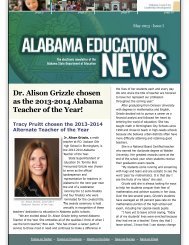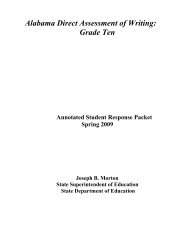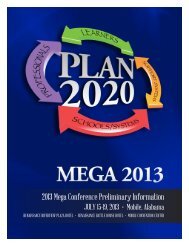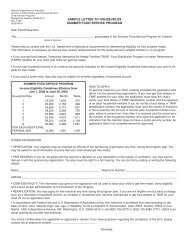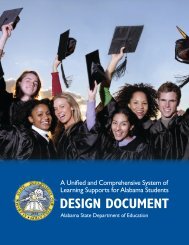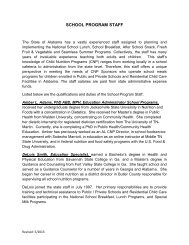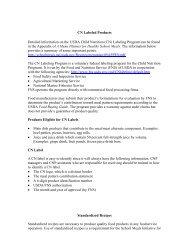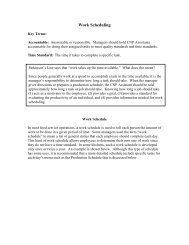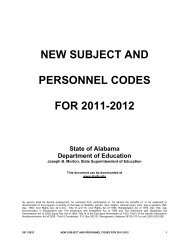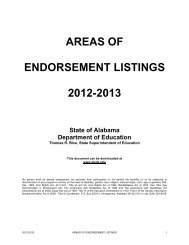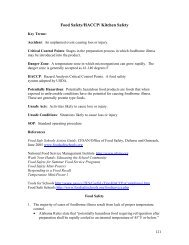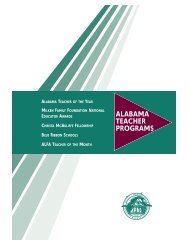Annual Report 2001 - Alabama Department of Education
Annual Report 2001 - Alabama Department of Education
Annual Report 2001 - Alabama Department of Education
You also want an ePaper? Increase the reach of your titles
YUMPU automatically turns print PDFs into web optimized ePapers that Google loves.
<strong>Alabama</strong> <strong>Department</strong> <strong>of</strong> <strong>Education</strong><br />
EDUCATION RESEARCH<br />
<strong>Education</strong> Research is charged with producing the grading scales for the State Superintendent's <strong>Report</strong> Card and assisting<br />
elements <strong>of</strong> the State <strong>Department</strong> <strong>of</strong> <strong>Education</strong> with technical issues related to testing, evaluation, and pr<strong>of</strong>essional<br />
development. In addition, the section conducts research for the State Superintendent <strong>of</strong> <strong>Education</strong> in areas such as<br />
school finance, equity and adequacy issues, and cost <strong>of</strong> public education, state rankings, and teacher salary rankings relative<br />
to the nation and other southeastern states. The section also provides analytic and statistical support for various<br />
programs (i.e. special education issues) and technical method assistance to local educational agencies.<br />
DIRECTOR- CLASSROOM IMPROVEMENT/TEAM COORDINATION<br />
The Classroom Improvement Section is responsible for the development and implementation <strong>of</strong> the minimum curriculum<br />
content, standards, and course design for students in the public schools, Grades K-12. It is also responsible for<br />
instructional support programs such as textbook selection, scholarship programs, and counseling and guidance services.<br />
In addition, content specialists assist local systems with instructional and administrative strategies to enhance effective<br />
learning. The state-sponsored assessment program, designed to measure the effectiveness <strong>of</strong> the implementation <strong>of</strong><br />
instruction and curriculum is also developed and implemented through this section. Together, all <strong>of</strong> the areas within this<br />
section form the basis <strong>of</strong> the implementation <strong>of</strong> the accountability law as defined by the <strong>Alabama</strong> Legislature.<br />
SCHOOL ASSISTANCE TEAMS<br />
As recommended by the 21st Century <strong>Report</strong>, the state superintendent organized the State <strong>Department</strong> <strong>of</strong> <strong>Education</strong> staff<br />
into School Assistance Teams. The goal <strong>of</strong> this organization is to maximize Local <strong>Education</strong> Agency (LEA) support<br />
services. The 10 cross-functional teams have common assignments and work to provide more efficient service and<br />
assistance to the Local <strong>Education</strong> Agencies. The creation <strong>of</strong> School Assistance Teams allows the maximization <strong>of</strong> talent,<br />
knowledge, and expertise <strong>of</strong> team members to connect LEAs with the needed resources and support to implement the<br />
goals <strong>of</strong> the State Board <strong>of</strong> <strong>Education</strong>. It also represents a shift from the SDE regulatory institution with fragmented<br />
delivery <strong>of</strong> services and support to that <strong>of</strong> a resource and partner to help LEAs improve student achievement and meet<br />
local and state goals.<br />
The teams seek to provide timely and responsive assistance upon request by the LEAs. Team members work with local<br />
school systems to identify and prioritize local system needs, and then to provide a more comprehensive range <strong>of</strong> services.<br />
The new structure provides a steady flow <strong>of</strong> information from local systems to the state superintendent on each<br />
team’s work with local systems, enabling further planning by the SDE to continue providing beneficial assistance.<br />
DIRECTOR- CAREER/TECHNICAL EDUCATION<br />
The Career/Technical <strong>Education</strong> Section is responsible for facilitating career/technical education programming at the<br />
state and federal level in all local education agencies. Staff serve in a technical assistance capacity to deliver state-<strong>of</strong>the-art<br />
and articulated career/technical and academic education. The section supports the goals <strong>of</strong> the State Board <strong>of</strong><br />
<strong>Education</strong> by performing duties as assigned through the Division <strong>of</strong> Instructional Services.<br />
DIRECTOR- TEACHER EDUCATION AND CERTIFICATION<br />
The Teacher <strong>Education</strong> and Certification Section is responsible for ensuring that colleges and universities meet the continuously<br />
updated teacher education program approval standards adopted by the State Board <strong>of</strong> <strong>Education</strong> (SBE).<br />
Persons who meet SBE test requirements, complete approved programs, and meet background clearance requirements<br />
are eligible for certification. Certificates are also awarded to persons who meet alternative route criteria adopted by the<br />
SBE. Assistance is provided to persons who are considering education as a career, to members <strong>of</strong> the U.S. military who<br />
wish to pursue a second career in teaching, to students enrolled in teacher education programs, to local education agencies<br />
in need <strong>of</strong> personnel, and to individuals seeking employment.<br />
54



